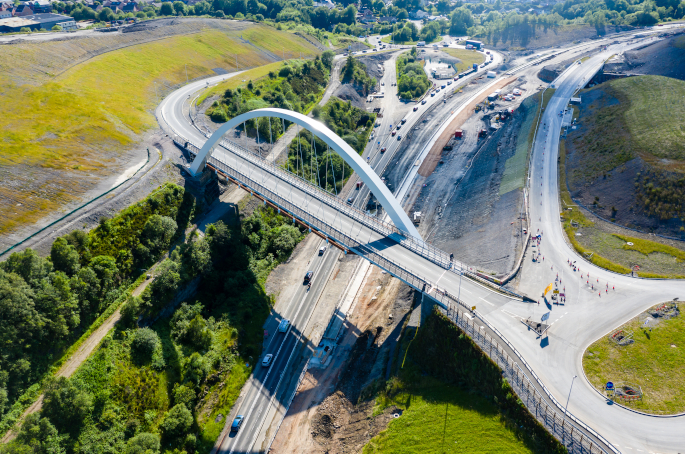- Local transport: Grade D- minus “at risk” (2010 Grade: D)
- Flood management: Grade C- minus “requires attention” (2010 Grade: C)
- Energy: Grade C- minus “requires attention” (2010 Grade: D)
- Strategic transport: Grade B “adequate for now” (2010 Grade: B)
- Water: Grade B “adequate for now” (2010 Grade: B)
- Waste: Grade C+ plus “requires attention”(2010 Grade: C)
Transport network "at risk", ICE report claims

The government and local authorities must establish a more ambitious joint programme to clear the road maintenance backlog. That’s one of the key recommendations from the Institution of Civil Engineers (ICE) after local transport was graded D- (“at risk”) in its State of the Nation: Infrastructure 2014 “scorecard” report published today (26 June).The UK’s transport, energy, flood, waste and water networks have all been graded from A to E.ICE welcomed the progress since 2010 in improving infrastructure and positioning it as a core enabler of economic growth, but it said more needed to be done if we are to have world class infrastructure – in particular on the issue of resiliency given its impact on the economy and the major challenges ahead. This was highlighted by the “at risk” or “requires attention” grades for flood management, energy and local transport networks – due to the narrowing gap between supply and demand for energy, inadequate resilience to flooding and the decline in maintenance of both flood defences and local roads following investment cuts.ICE claim that more frequent extreme weather events will make it increasingly difficult to operate our infrastructure networks in all conditions at the level of service we expect, and our expectations of availability will need to change.The ICE report said resilience – including the “domino effect” where the failure of one system can affect the operation of another - should be embedded into the criteria used as a basis for making decisions on priority infrastructure projects, to better reflect future challenges.It also warned however, that while we need to build the UK’s resilience, our infrastructure cannot be resilient to every eventuality, and that it will become more difficult to operate all infrastructure networks, at all times, in all conditions. It said a shift in the public’s expectations on infrastructure availability would be needed.State of the Nation report chair and ICE vice president, Keith Clarke CBE, said: “As the 2013/14 winter floods showed, unplanned interruptions in our networks are costly to society and the economy. They happen because we are trying to run all services at all times, and are deemed unacceptable as the public expect a certain level of service. Government ultimately bears the risk for the resulting impact.“It is becoming clear that extreme weather events will become more frequent, and it is time that factors such as availability, resilience and the “domino effect” across the networks when one network fails –as we saw recently when our flood defences were overwhelmed and this in turn disrupted transport, energy, water and waste networks - are rooted into the criteria used to make decisions on which projects go ahead so new infrastructure is more “future proofed”.“But, importantly, we must all recognise that our infrastructure cannot be resilient to everything and it will become more difficult to run all services in all conditions – it will also not be cost effective. Funding will always be constrained as there are only two sources – tax and user charging - both ultimately falling on the consumer. The balance between the two is a choice for the government of the day, but irrespective of where it comes from, both are constrained resources and must be used efficiently.“Clearly there are some difficult decisions ahead regarding just how resilient the UK should be, and also what networks can and should operate 24/7 in what conditions. We can then plan more effectively – avoiding costly unplanned disruptions – and adapt. Management of the public’s expectations on availability during adverse conditions will need to form a key part of this process.“The onus is on government to make these choices for public sector infrastructure, and it must also build on its efforts to provide the right regulatory incentives to improve resilience within private sector infrastructure.” Grades:
























